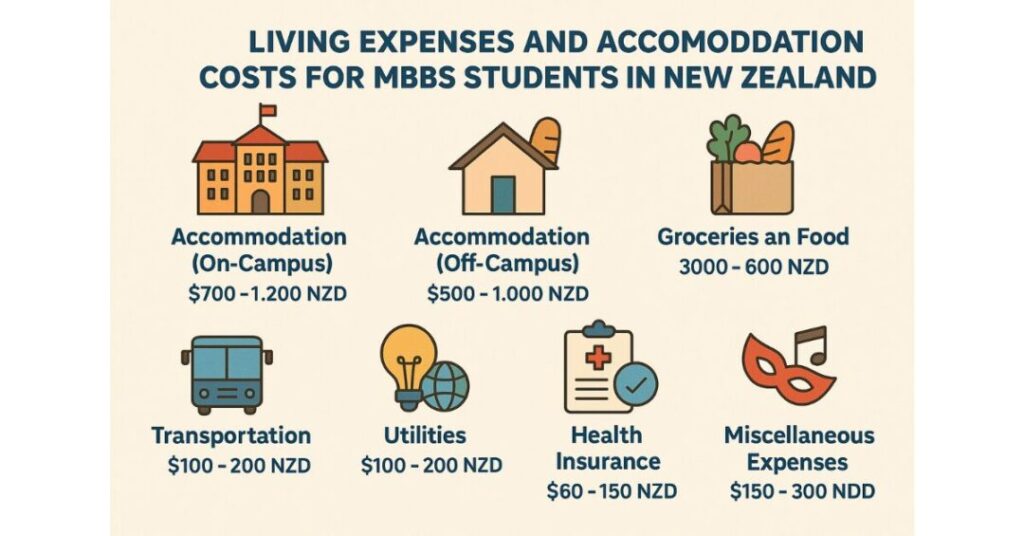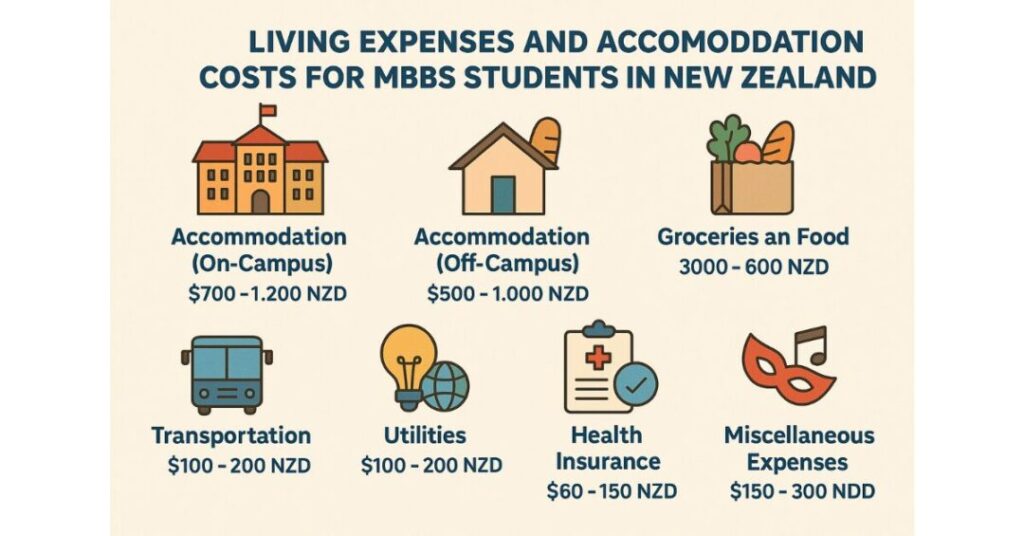13 September 2025
6 minutes read
What is the Cost of Studying Medicine in New Zealand for Indian Students?

Key Takeaways:
- The cost of studying medicine in New Zealand ranges from NZD 70,000 to NZD 90,000 per year, with additional living expenses to consider.
- Top universities like the University of Auckland and University of Otago offer high-quality medical education and global career opportunities.
- Scholarships and financial aid options are available to help reduce the financial burden for international students.
The cost of studying medicine in New Zealand is a critical factor for Indian students considering pursuing an MBBS degree abroad. With tuition fees ranging between NZD 70,000 to NZD 80,000 per year, it’s not a light financial commitment. This, combined with living expenses, often becomes a major concern for prospective medical students.
However, while the cost may seem high, the quality of education at top universities like the University of Auckland and the University of Otago provides value that’s hard to match. Scholarships for International students, part-time work opportunities, and careful planning can significantly ease the financial burden for international students.
What is the Tuition Fee for Studying Medicine in New Zealand for Indian Students?
When considering studying MBBS in New Zealand, one of the first factors that come to mind is the tuition fee. The cost of studying medicine in New Zealand can vary depending on the university and the type of program.
Indian students looking to pursue MBBS in New Zealand should be aware of the range of tuition fees across various universities. Here’s a look at the approximate tuition fees for MBBS programs at top medical universities in New Zealand:
| University | Annual Tuition Fee (NZD) | Program Duration | Location |
|---|---|---|---|
| University of Auckland | 80,000 – 90,000 | 6 years | Auckland |
| University of Otago | 75,000 – 80,000 | 6 years | Dunedin |
| University of Waikato | 70,000 – 75,000 | 6 years | Hamilton |
| Auckland University of Technology (AUT) | 75,000 – 85,000 | 6 years | Auckland |
| Victoria University of Wellington | 70,000 – 80,000 | 6 years | Wellington |
| University of Canterbury | 72,000 – 78,000 | 6 years | Christchurch |
| Unitec Institute of Technology | 68,000 – 75,000 | 6 years | Auckland |
| Massey University | 70,000 – 76,000 | 6 years | Palmerston North |
| Southern Institute of Technology | 65,000 – 70,000 | 6 years | Invercargill |
| Otago Polytechnic | 60,000 – 68,000 | 6 years | Dunedin |
These figures reflect the general costs for international students, including Indian students, pursuing a Bachelor of Medicine and Bachelor of Surgery (MBBS) degree. It’s important to note that fees may differ slightly based on the specific course or other factors. While tuition fees may seem steep, New Zealand’s high-quality medical education offers long-term value.
Living Expenses and Accommodation Costs for MBBS Students in New Zealand
When deciding to study in New Zealand, one of the key considerations for international students, including Indian students, is the cost of living and accommodation. Aside from the tuition fees for pursuing an MBBS degree, understanding the day-to-day expenses is crucial for financial planning. The cost of living in New Zealand can vary depending on the city, lifestyle, and housing choices.

However, it’s important to note that the overall living expenses are more affordable compared to other popular study abroad destinations. Below is an estimate of the living and accommodation costs for medical students in New Zealand:
| Expense | Average Cost (NZD per month) | Details |
|---|---|---|
| Accommodation (On-Campus) | 700 – 1,200 | University dormitories or private rentals |
| Accommodation (Off-Campus) | 500 – 1,000 | Private rentals, shared apartments |
| Groceries and Food | 300 – 600 | Monthly grocery expenses and eating out |
| Transportation | 100 – 200 | Public transport or personal vehicle |
| Utilities (Electricity, Internet, etc.) | 100 – 200 | Basic utilities in shared accommodation |
| Health Insurance | 60 – 150 | Mandatory for international students |
| Miscellaneous Expenses | 150 – 300 | Entertainment, personal items, etc. |
While the cost of living in New Zealand may vary, it is manageable with careful planning and budgeting. Additionally, students can reduce expenses by opting for shared accommodations or part-time work, which is allowed for international students during their studies. By understanding these living costs, Indian students can better prepare themselves to pursue MBBS in New Zealand and enjoy a rewarding educational experience.
Scholarship Options and Financial Aid Offered by MBBS Colleges in New Zealand for Indian Students
Studying medicine in New Zealand is an exciting opportunity for Indian students who want to pursue an MBBS degree. However, the cost of studying medicine in New Zealand can be a significant concern. Fortunately, there are various scholarships and financial aid options available for international students, including those pursuing an MBBS degree. These scholarships help reduce the financial burden and make education more accessible.
The New Zealand government and universities offer several merit-based scholarships, and many medical colleges provide financial assistance to talented students. Here is a list of some popular scholarships and financial aid options for MBBS students in New Zealand:
| Scholarship | Eligibility Criteria | Amount (NZD) | Offered By |
|---|---|---|---|
| New Zealand International Scholarships | Open to all international students, including Indian students | Full tuition, living expenses, travel | Government of New Zealand |
| University of Auckland International Student Scholarships | For students applying to study MBBS at the University of Auckland | Up to NZD 10,000 | University of Auckland |
| University of Otago International Scholarships | Merit-based for students pursuing MBBS at University of Otago | Up to NZD 15,000 | University of Otago |
| Auckland University of Technology Scholarships | Available for international students pursuing MBBS programs | NZD 5,000 – 10,000 | Auckland University of Technology |
| Massey University International Excellence Scholarships | For students with excellent academic records | Up to NZD 20,000 | Massey University |
| Victoria University of Wellington Scholarships | Open to international students applying for MBBS programs | Up to NZD 10,000 | Victoria University of Wellington |
| Otago Medical School Scholarships | Available for top-performing medical students | NZD 5,000 – 10,000 | University of Otago |
| Massey University Study Abroad Scholarships | For students from selected countries including India | NZD 3,000 – 5,000 | Massey University |
| New Zealand Aid Programme | For students from developing countries, including India | Full tuition, living allowance | New Zealand Government |
| Medical Council of New Zealand Scholarships | For medical students applying for internships and research | Varies depending on the program | Medical Council of New Zealand |
These scholarships provide excellent opportunities for Indian students to reduce the cost of studying MBBS in New Zealand. Students interested in these options should apply early and check the eligibility criteria to ensure they meet the requirements.
Long-Term Financial Benefits of Studying Medicine in New Zealand for International Students
Studying medicine in New Zealand offers several long-term financial benefits for international students, especially Indian students. While the cost of studying medicine in New Zealand may seem high initially, the returns on investment are substantial.
New Zealand’s world-class medical education, coupled with its excellent healthcare system, provides graduates with exceptional opportunities both within the country and globally. Students who graduate with an MBBS degree from New Zealand universities are highly regarded and can practice medicine in many countries, including India, after fulfilling the necessary requirements of the Medical Council of India.
One of the biggest financial benefits of pursuing an MBBS course in New Zealand is the strong earning potential for medical professionals. The salaries for doctors in New Zealand are competitive, and the country offers attractive work opportunities post-graduation.
Furthermore, the 6-year MBBS degree program in New Zealand is designed with state-of-the-art technology and medical practices, ensuring that graduates are well-equipped to enter the global job market. Many students who study in New Zealand also have the option to secure permanent residency, further increasing the long-term financial rewards. With a globally recognized MBBS degree, students can enjoy job stability and the opportunity to earn a high salary throughout their medical careers.
What are the eligibility criteria for MBBS admission in New Zealand?
If you want to study MBBS in New Zealand, it’s essential to understand the eligibility criteria for admission to MBBS programs at New Zealand medical universities. These criteria are designed to ensure that students have the academic foundation and skills necessary for success in the 6-year MBBS course, which offers a rigorous and comprehensive medical education.

Here are the key eligibility criteria for MBBS admission in New Zealand:
Educational Qualifications:
Completion of higher secondary education (12th grade) with a focus on subjects like Biology, Chemistry, and Physics. Minimum marks required in the qualifying exam (usually 65% or higher).
English Language Proficiency:
Proof of English proficiency through tests like IELTS or TOEFL. Minimum scores usually range between 6.5 to 7.0 in IELTS.
Entrance Exam:
Some universities may require international students to appear for an entrance exam, such as the UCAT (University Clinical Aptitude Test) or BMAT (Biomedical Admissions Test).
Age Limit:
Applicants must be at least 17 years old at the time of admission.
Medical Council Requirements:
Indian students applying for MBBS in New Zealand must ensure they meet the eligibility criteria for recognition by the Medical Council of India (MCI) to practice in India after graduation.
Admission to MBBS:
The student must successfully apply for MBBS in New Zealand, meeting the specific admission deadlines and providing all required documentation.
These criteria apply to universities offering MBBS programs in New Zealand, such as the University of Auckland and the University of Otago, which are recognized globally for their high standard of education and medical training.
By fulfilling these requirements, Indian students can secure a spot in New Zealand’s top medical colleges and benefit from a state-of-the-art medical education. Keep in mind that while the cost of studying medicine in New Zealand may be high, scholarships and financial aid options are available for international students to help manage the expenses.
Conclusion
The cost of studying medicine in New Zealand presents both challenges and opportunities for Indian students. While MBBS in New Zealand fees can be substantial, top universities and MBBS colleges in New Zealand offer world-class education, training, and global recognition.
With state-of-the-art technology and medical practices, New Zealand provides an excellent environment for those pursuing a 6-year MBBS course. Additionally, scholarships and financial aid options help alleviate some of the financial burdens. If you’re ready to embark on this rewarding journey, make sure you meet the eligibility criteria for MBBS in New Zealand and explore your opportunities at renowned MBBS universities.
If you want to study MBBS in New Zealand, Ambitio can guide you through the application process, scholarship options, and university selection. Contact us today to take the first step!
FAQs
How long is the MBBS course in New Zealand?
It’s a 6-year program, inclusive of practical training.
Are there any entrance exams for MBBS in New Zealand?
Apart from NEET for Indian students, English proficiency tests like IELTS or TOEFL are required.
What’s the average salary of an MBBS graduate in New Zealand?
On average, MBBS graduates can earn between NZD 70,000 to NZD 100,000 initially, depending on the specialization and location.
Is it mandatory to return to India after completing an MBBS from New Zealand?
No, students can either continue further studies, work in New Zealand, or return to India or any other country of their choice.
Can I apply for a Permanent Residency in New Zealand after my MBBS?
Yes, after fulfilling certain criteria, including specific years of work experience, you can apply for PR.
Is the MBBS degree from New Zealand recognized worldwide?
Yes, the degree is globally recognized and is especially acknowledged by medical councils in numerous countries, including India.
Are there opportunities for postgraduate medical studies in New Zealand?
Absolutely! New Zealand boasts several specialized postgraduate medical courses that students can pursue after their MBBS.

You can study at top universities worldwide!
Get expert tips and tricks to get into top universities with a free expert session.
Book Your Free 30-Minute Session Now! Book a call now




























